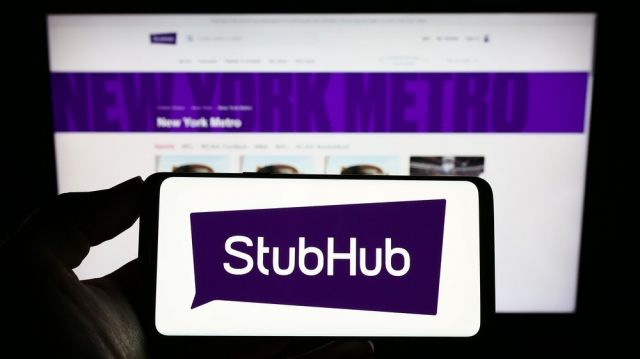Chime IPO – how to trade Chime shares
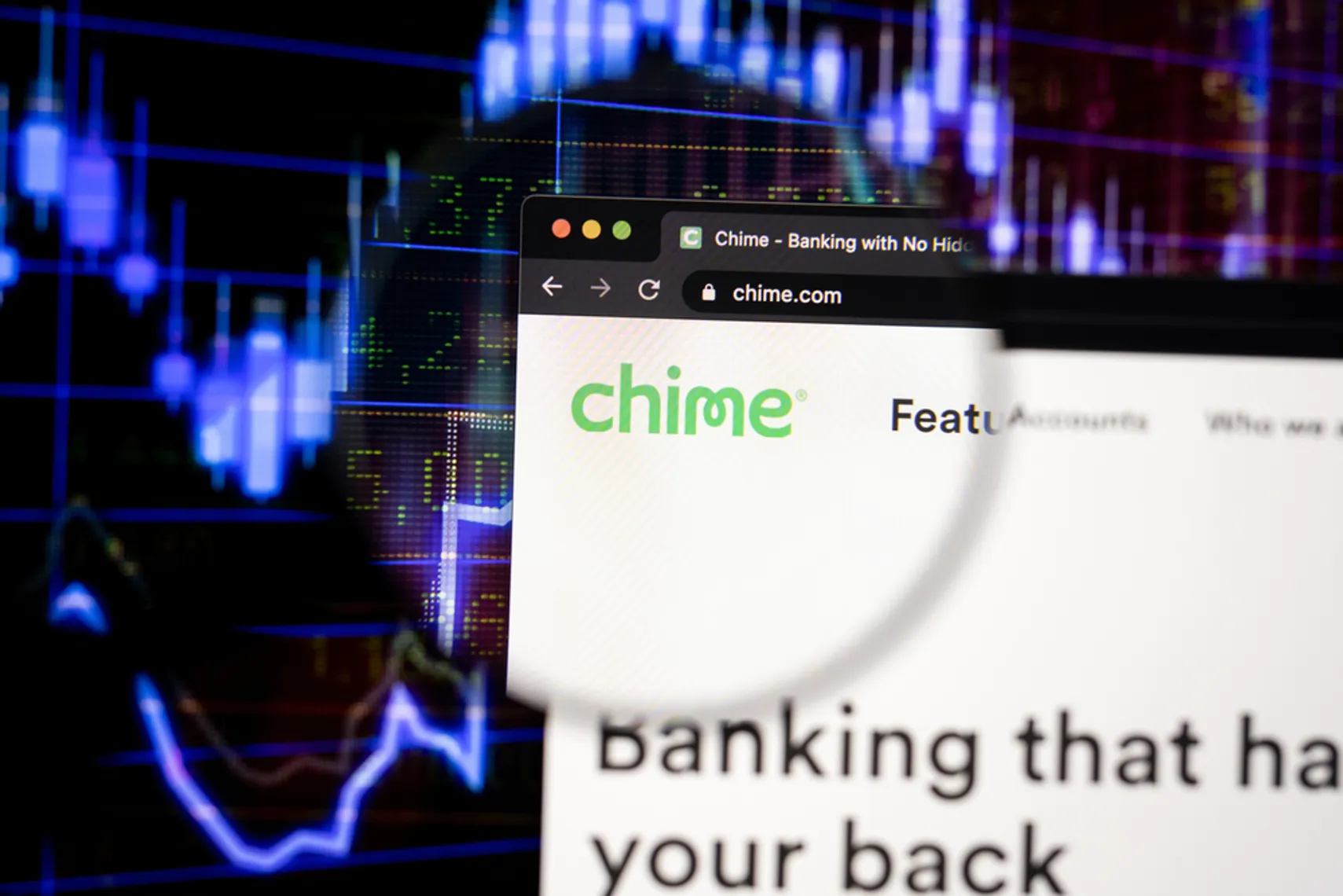
Learn about Chime and its potential IPO, the factors that may affect its share price, and how to trade Chime stock via CFDs when it lists.
When was the Chime IPO date?
Chime made its market debut on 11 June 2025, pricing its initial public offering (IPO) at $27 per share to raise $864m. The Nasdaq Global Select Market listing valued the US fintech at around $11.6bn on a fully diluted basis – less than half of the $25bn valuation it received during its last major funding round.
What does the IPO reveal about Chime and the market?
The IPO, which was initially delayed following political uncertainty in early 2025, ultimately went ahead amid a rebound in tech listings. It marks one of the largest fintech IPOs in the US in recent years.
Chime generates most of its revenue from interchange fees – small transaction charges collected each time a customer makes a purchase with a Chime-branded card. According to its IPO prospectus, the company had 8.6 million active members as of 31 March 2025, with average revenue per user at $251 in Q1.
While the IPO raised substantial funds, the valuation reset reflects a broader cooling of investor expectations following the post-pandemic boom. Market sentiment, improved listing conditions, and Chime’s profitability on an EBITDA basis in Q1 2024 all helped pave the way for the float.
What is Chime?
Chime is a US-based neobank that offers digital-first banking services with no physical branches. Founded in 2012 by Chris Britt and Ryan King, it positions itself as a consumer-friendly alternative to traditional banks, offering fee-free accounts, early direct deposit, and automatic savings tools.
Key milestones in Chime’s history
-
2012 – founded in San Francisco with a mission to make banking more accessible and transparent.
-
2014 – publicly launched its mobile banking app, offering features like early direct deposit and no-fee accounts.
-
2018 – surpassed 1 million users, began scaling rapidly with the rise of digital banking.
-
2020 – became the most downloaded neobank app in the US amid the pandemic-led shift to online banking.
-
2021 – reportedly reached a $25bn valuation after raising $750m in a Series G funding round led by Sequoia Capital and SoftBank.
-
2023 – Chime reported $1.3 billion in revenue for 2023, demonstrating significant financial growth and scalability.
-
2025 – completed IPO, raising $864m at $27 a share.
Chime’s key features
-
No-fee banking – no monthly fees, no overdraft fees (up to a limit), and access to 60,000+ ATMs.
-
Early direct deposit – users can access their paycheck up to two days early.
-
Automatic savings – rounds up purchases or allocates a portion of income into a savings account.
-
Credit builder card – helps users improve their credit score with no annual fee or credit check.
-
User-friendly app – offers real-time notifications, budgeting tools, and instant transaction alerts.
Chime operates via partnerships with regulated banks such as The Bancorp Bank and Stride Bank, which hold customer deposits and issue debit and credit cards. This model has enabled fast growth while avoiding full banking license requirements.
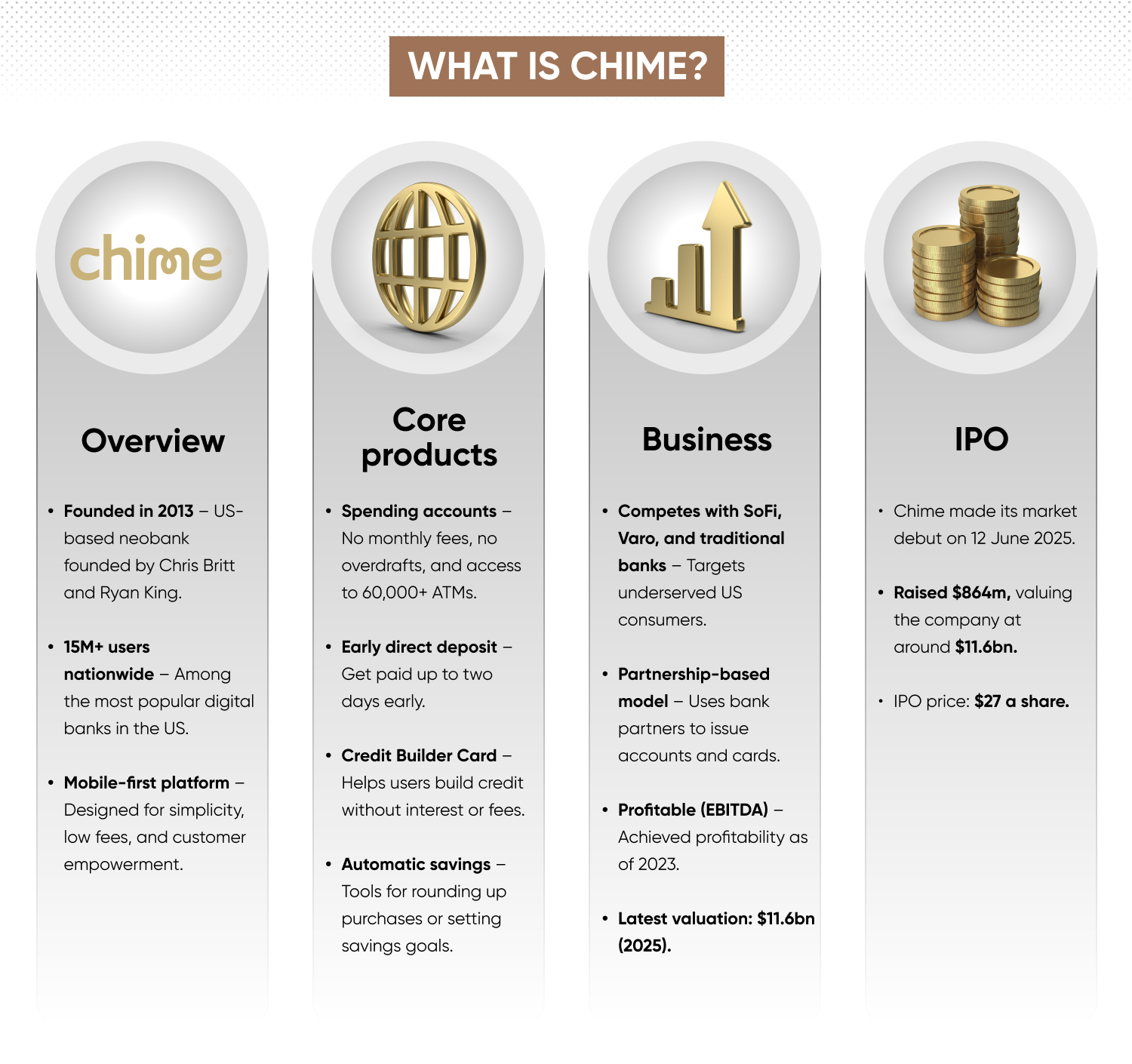
How does Chime make money?
Chime’s business model is based on providing no-fee financial services while generating revenue through backend financial infrastructure and partner relationships.
|
Revenue stream |
Description |
|
Interchange fees |
Chime earns a portion of the transaction fees paid by merchants when users spend using their Chime debit or credit builder cards. These fees represent a primary revenue stream. |
|
Banking-as-a-service partnerships |
By outsourcing core banking functions to partner banks, Chime can offer financial services with fewer operational costs, while benefiting from revenue-sharing agreements. |
|
Interest income |
Chime earns interest from customer deposits held at partner banks, similar to how traditional banks generate net interest margin. |
|
Referral partnerships |
Chime partners with other fintechs and services, such as tax preparation or investing platforms, earning referral fees from successful sign-ups. |
|
Credit builder and savings tools |
While the core features are free, the volume of users on these tools helps drive engagement and increases interchange volumes. |
What might influence the Chime live stock price?
Chime’s live stock price will likely be shaped by a wide mix of internal performance metrics, market sentiment, macroeconomic trends, and the evolving competitive landscape. Here’s a closer look at the key drivers that could impact Chime’s live share price, both in the short and long term.
Macroeconomic trends and fintech sentiment
Chime’s business model is tied closely to consumer financial behaviour, so macroeconomic conditions will play a significant role. Interest rates, inflation, consumer credit trends, and employment levels all influence how users interact with financial products like checking accounts, savings tools, and credit-builder cards.
For example, in a low-rate environment, Chime’s revenue from deposit interest or interchange fees could be pressured. Conversely, as rates rise and economic activity picks up, deposit balances and card spend might grow, helping Chime’s bottom line.
Investor sentiment toward fintech and neobanks is also crucial. Between 2021 and 2023, neobank valuations faced intense scrutiny due to unproven business models and tightening regulation. A rebound in fintech IPOs, or renewed institutional interest in digital banks, could lead to stronger support for Chime shares in early trading.
Company fundamentals: revenue, users, and profitability
Traders and analysts will pay close attention to Chime’s financial results post-IPO. As of 2023, the company claimed profitability on an EBITDA basis – a notable achievement in the neobank space. But after listing, investors will want to see:
-
Sustained net income growth
-
Rising average revenue per user (ARPU)
-
Improving operating margin
-
Controlled customer acquisition costs (CAC)
Any signs that Chime’s growth is slowing, or that profitability is dependent on overly aggressive cost-cutting, could trigger volatility. Conversely, strong quarterly reports could spark rallies, especially if Chime outperforms other listed fintechs like SoFi or Nubank.
Chime’s user base, estimated at over 8.6 million, is also a closely watched figure. Growth in verified active users, total card spend, and deposit balances will serve as proxies for customer engagement and revenue potential.
Regulatory landscape and compliance
Although Chime doesn’t hold a traditional banking license, it operates under a regulated structure using partnerships with The Bancorp Bank and Stride Bank. This setup has drawn both praise (for scalability) and criticism (for potential risk exposure). Any changes in how US regulators view Banking-as-a-Service (BaaS) models could impact investor confidence.
For instance, if the Office of the Comptroller of the Currency (OCC) or FDIC were to crack down on partner bank arrangements, Chime’s ability to onboard new users or offer services like overdraft protection could be affected. On the flip side, if Chime moves to acquire a national bank charter, the stock could benefit from increased regulatory clarity and institutional trust.
Competitive threats and innovation
Chime operates in a crowded space. US neobanks like Varo, Current, and Dave are all competing for similar user segments, while established fintechs like PayPal and Block continue to expand their banking features. Traditional banks are also launching digital-only brands, hoping to reclaim market share from disruptors like Chime.
The company’s ability to stay ahead through innovation – such as launching new credit products, expanding investment tools, or offering AI-driven budgeting – will help define its growth narrative. Key strategic moves like partnerships with payroll platforms, retail chains, or mobile wallet providers could unlock new revenue streams and drive the stock upward.
Chime’s lack of international presence could also become a talking point. If it signals plans to expand abroad, this could spark investor optimism and lead to bullish trading activity.
Media coverage, trading volumes, and sentiment
Chime’s stock price will also be influenced by short-term market dynamics:
-
Media coverage: high-profile press, whether positive or negative, can drive sentiment and volume. For instance, stories on app outages, data breaches, or executive turnover could create sell pressure.
-
Social sentiment: retail traders following the stock on platforms like Reddit, X (Twitter), and TikTok could lead to volatile price swings, particularly in the early days of trading.
-
Earnings calls and guidance: as a newly public company, Chime’s first few quarterly earnings reports will set the tone. Strong guidance or a surprise beat could fuel upward momentum, while missed expectations could lead to sharp pullbacks.
-
Short interest and options activity: high short interest or unusual options volume may create technical setups that amplify moves, including potential short squeezes.
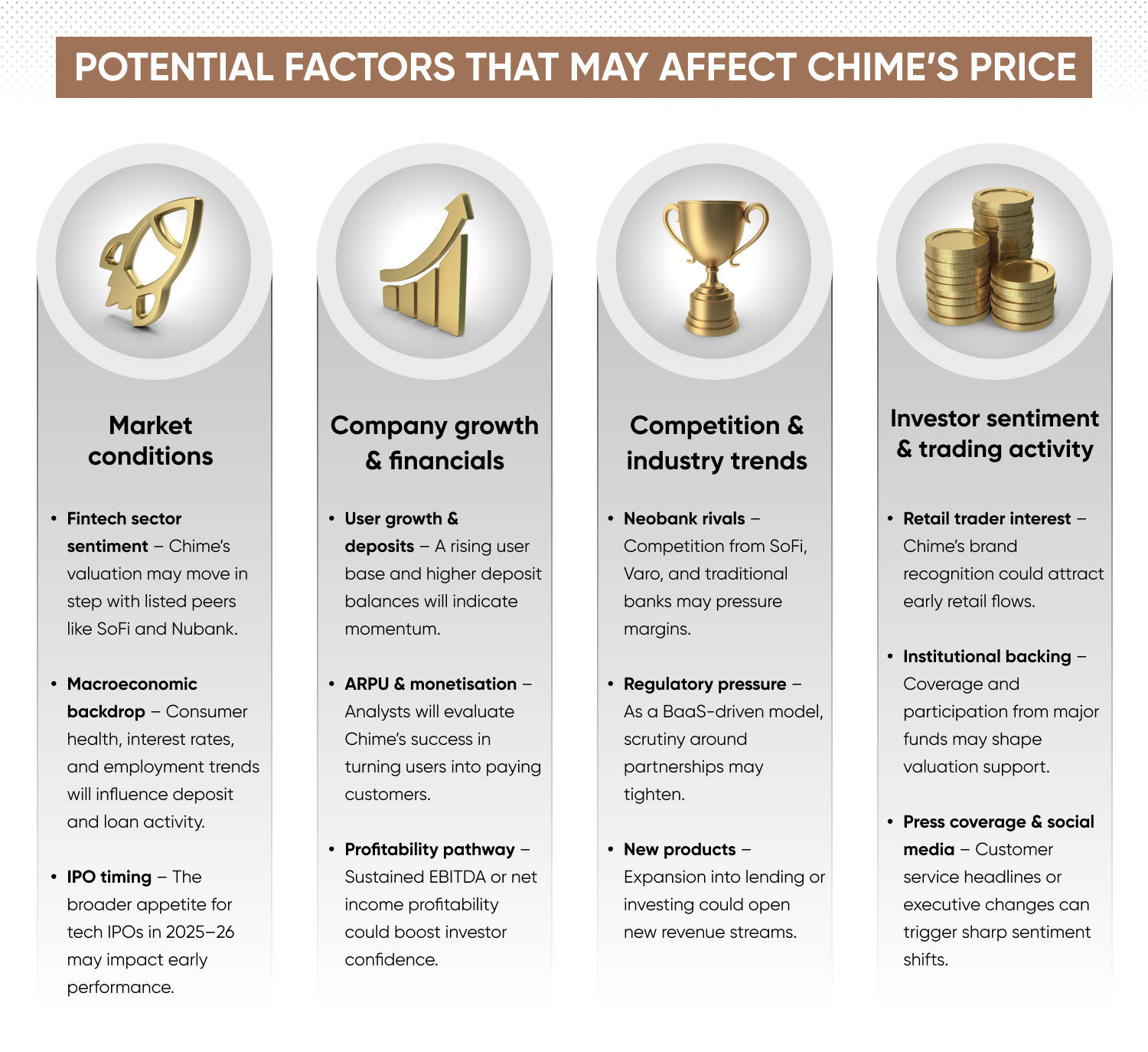
How to trade Chime stocks via CFDs
Trading Chime shares via contracts for difference (CFDs) allows investors to speculate on price movements without owning the underlying stock.
- 1. Choose a brokerage platformFind a broker that offers Chime stock CFDs. Capital.com offers thousands of instruments, including stocks, indices, and commodities.
- 2. Open a trading accountRegister with the broker, completing identity verification and account setup.
- 3. Deposit fundsRegister with the broker, completing identity verification and account setup.
- 4. Monitor the stockOnce listed, keep up with Chime’s financial updates, regulatory developments, and stock price movements.
- 5. Place a tradeUse CFDs to go long (buy) or short (sell), based on your market view. You can apply stop-loss and take-profit orders to manage risk.
Learn more about contracts for difference in our CFDs trading guide.
Which other fintech stocks can I trade?
Here are some listed fintech stocks that offer exposure to similar business models:
-
SoFi (SOFI) – US-based digital bank offering loans, investment, and credit products.
-
Block (SQ) – offers digital payments, Cash App, and BNPL through Afterpay.
-
Paypal (PYPL) – one of the original fintech giants, owning Venmo and engaging in crypto and merchant services.
-
Affirm (AFRM) – specialises in BNPL and digital credit, with key partnerships including Amazon.
-
Visa (V) & Mastercard (MA – foundational players in the payments space that support the infrastructure behind fintech.
Learn more about shares and stock markets in our comprehensive shares trading guide.
FAQ
Who owns Chime?
Major stakeholders in Chime include CEO Chris Britt, co-founder Ryan King, and institutional investors like Sequoia Capital, DST Global, Tiger Global, and SoftBank Vision Fund.
How much is Chime worth?
Chime was last valued at around $11.6bn following its IPO in June 2025. Its valuation at IPO may be adjusted based on market conditions, financial performance, and investor sentiment.
When did Chime IPO?
The Chime IPO occurred on 12 June 2025. Previously, Chime hadn’t confirmed a date, but market analysts had anticipated a listing in 2025 or 2026.
How can I invest in Chime before its IPO?
Pre-IPO shares may be available via secondary marketplaces like Forge Global or EquityZen, though these are usually limited to accredited investors. Most retail traders will need to wait until the public listing.
Are Chime available for CFD trading?
Chime shares can now be traded as a CFD with Capital.com. You can speculate on the price movement without owning the underlying stock, going long or short depending on your market view.
Discover more upcoming IPOs
Stay informed on upcoming IPOs, market trends, and the newest trading opportunities
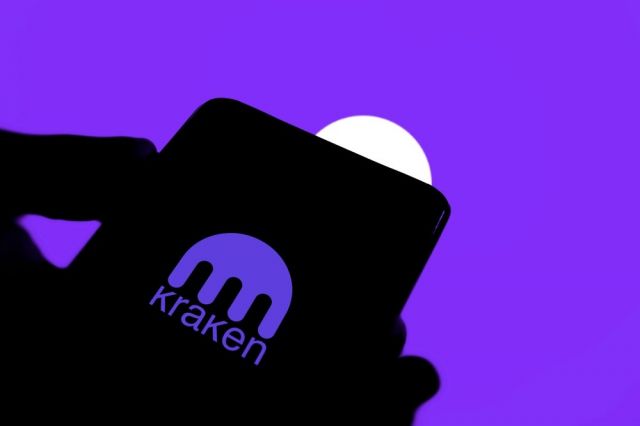
Kraken IPO
